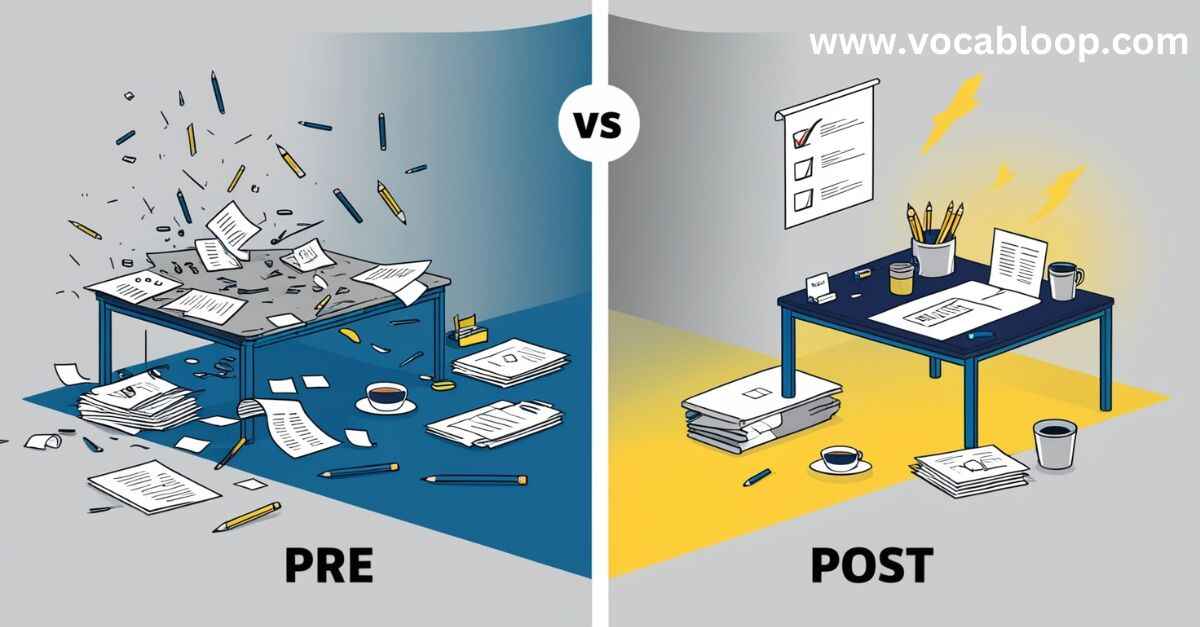Tiny Words, Big Impact!
In the vast landscape of the English language, few elements pack as much punch as the prefixes ‘pre’ vs ‘post’. These small word parts, when attached to base words, can dramatically shift meaning and context. Let’s dive into the world of these powerful prefixes and unlock their potential to enhance your communication skills.
‘Pre’ vs ‘Post’: What’s the Difference?

Let’s break down the core distinctions between these prefixes:
Timeline:
- Pre: Indicates before an event or state
- Post: Refers to after an event or state
The timeline aspect is the most straightforward difference. ‘Pre’ always points to something that comes before, while ‘post’ always indicates something that follows.
Function:
- Pre: Often implies preparation, anticipation, or prevention
- Post: Typically involves reflection, analysis, or consequence
This functional difference is crucial for understanding the deeper implications of these prefixes. ‘Pre’ is forward-looking, often involving planning or readiness. ‘Post’ is retrospective, dealing with outcomes or follow-up actions.
Context:
- Pre: Sets the stage, provides background, or establishes conditions
- Post: Deals with results, effects, or subsequent developments
The context in which these prefixes are used can significantly alter the tone and focus of a discussion. ‘Pre’ often provides necessary context or background, while ‘post’ is more about understanding what has transpired.
Emotional Tone:
- Pre: Can evoke feelings of excitement, anxiety, or caution
- Post: Might elicit reflection, relief, or analysis
The emotional connotations of ‘pre’ and ‘post’ can be quite different. ‘Pre’ often carries a sense of anticipation, which can be either positive (excitement) or negative (anxiety). ‘Post’ tends to be more reflective, sometimes with a sense of accomplishment or, in other cases, analysis of what has occurred.
Remember:
Both prefixes can attach to nouns, verbs, and adjectives to create new words. They’re incredibly versatile tools in our linguistic toolkit. Here are some examples:
- Nouns: pre-war (era), post-dinner (coffee)
- Verbs: pre-heat (the oven), post-date (a check)
- Adjectives: pre-existing (condition), post-modern (art)
This versatility allows for precise communication across a wide range of topics and contexts.
Pronunciation
Proper pronunciation enhances clarity in communication. Here’s a quick guide:
- Pre: Pronounced as /pri/ (rhymes with “tree”)
- Post: Pronounced as /poʊst/ (rhymes with “most”)
Be careful not to confuse ‘pre’ with ‘pree’ or ‘post’ with ‘posed’. These subtle differences in pronunciation can significantly affect meaning and comprehension.
In rapid speech, ‘pre’ and ‘post’ might be slightly shortened, but it’s important to maintain the distinct sounds to avoid confusion. Practice saying these prefixes clearly, especially when they’re part of longer words.
What is the Difference Between ‘Pre’ vs. ‘Post?’
Here’s a handy table to summarize the key differences:
| Aspect | ‘Pre’ | ‘Post’ |
| Timing | Before an event | After an event |
| Perspective | Anticipatory, preparatory | Reflective, consequential |
| Common Uses | Planning, prevention | Analysis, recovery |
| Tone | Often hopeful or cautious | Can be analytical or wistful |
| Example | Pre-nuptial agreement | Post-mortem examination |
| Focus | Future-oriented | Past-oriented |
| Action | Proactive | Reactive |
| In processes | Initial stages | Final stages |
| In medicine | Preventive care | Follow-up care |
| In education | Preparation | Evaluation |
This table provides a quick reference for understanding how ‘pre’ and ‘post’ differ across various aspects of language and usage.
Difference Between ‘Pre’ vs. ‘Post’? In American and British English
While the meanings remain consistent, there are subtle pronunciation differences:
- American English:
- ‘Pre’: /pri/
- ‘Post’: /poʊst/
- British English:
- ‘Pre’: /priː/ (slightly longer ‘ee’ sound)
- ‘Post’: /pəʊst/ (subtle difference in the ‘o’ sound)
The usage and spelling remain the same in both variants of English. However, it’s worth noting that certain compound words using these prefixes might have slight spelling variations between American and British English. For example:
- American English: “preexisting condition”
- British English: “pre-existing condition”
These differences are minor and don’t affect the overall meaning, but they’re worth being aware of, especially in formal or academic writing.
When to Use ‘Pre’ vs. ‘Post’

Choosing between ‘pre’ and ‘post’ depends on the temporal relationship you want to express:
- Use ‘pre’ when referring to something that happens or exists before a particular event or time.
- Use ‘post’ when discussing something that occurs or exists after a specific event or time.
For example:
- “We need to complete the pre-launch checklist.” (Before the launch)
- “The team will conduct a post-match analysis.” (After the match)
When deciding which prefix to use, consider the following:
- Timeline: Is the action or state occurring before or after the main event?
- Purpose: Are you preparing for something (pre) or dealing with its aftermath (post)?
- Context: How does the prefix affect the overall meaning of the sentence or discussion?
- Consistency: In a series of related terms, maintain consistent use of either ‘pre’ or ‘post’ for clarity.
Remember, the choice between ‘pre’ and ‘post’ can significantly impact the meaning of your sentence, so choose carefully!
Definition of ‘Pre’: What Does ‘Pre’ Mean?

‘Pre’ is a prefix meaning “before” in time or position. It indicates:
- Prior occurrence: pre-existing
- In front of: prefix
- In preparation: preheat
- Beforehand: premeditate
- Earlier than: prehistoric
This versatile prefix helps us express anticipation, preparation, and precedence. It’s a crucial tool for discussing events or states that occur before a specific point in time or before a particular action.
The power of ‘pre’ lies in its ability to succinctly convey a sense of anticipation or preparation. When we use ‘pre’, we’re often setting the stage for what’s to come, whether that’s a planned event, a natural process, or a conceptual framework.
Let’s Get Practical!
Understanding the difference between ‘pre’ and ‘post’ isn’t just about expanding your vocabulary. It’s a practical skill that can enhance your writing, speech, and comprehension. Here are some real-world applications:
- In business:
- ‘Pre-meeting briefing’ vs ‘Post-meeting action items’
- ‘Pre-launch marketing strategy’ vs ‘Post-launch customer feedback’
- ‘Pre-merger due diligence’ vs ‘Post-merger integration’
- In medicine:
- ‘Pre-operative care’ vs ‘Post-operative recovery’
- ‘Pre-natal vitamins’ vs ‘Post-natal depression’
- ‘Pre-diagnosis symptoms’ vs ‘Post-treatment follow-up’
- In education:
- ‘Pre-test anxiety’ vs ‘Post-exam relief’
- ‘Pre-reading activities’ vs ‘Post-reading discussion’
- ‘Pre-admission requirements’ vs ‘Post-graduation job prospects’
- In technology:
- ‘Pre-installation checklist’ vs ‘Post-installation troubleshooting’
- ‘Pre-update backup’ vs ‘Post-update system check’
- ‘Pre-launch beta testing’ vs ‘Post-launch user feedback’
- In sports:
- ‘Pre-game warm-up’ vs ‘Post-game analysis’
- ‘Pre-season training’ vs ‘Post-season awards’
- ‘Pre-match strategy’ vs ‘Post-match interview’
These prefixes help us navigate timing and sequence in various fields, from academic writing to everyday conversation. By using ‘pre’ and ‘post’ effectively, we can clearly communicate the order of events, the stages of a process, or the relationship between different actions or states.
Synonyms and Words Containing ‘Pre’
Here are some common words using the ‘pre’ prefix:
- Precaution
- Prelude
- Prerequisite
- Premonition
- Premature
- Precursor
- Preemptive
- Prejudice
- Prearrange
- Preconceive
Synonyms for ‘pre’ in different contexts might include:
- Before
- Prior to
- In advance of
- Ahead of
- Preliminary to
- Antecedent to
Understanding these synonyms and related words can help you vary your language and express nuanced meanings when discussing events or states that precede others.
Definition of ‘Post’: What Does ‘Post’ Mean?
‘Post’ is a prefix signifying “after” in time or order. It can indicate:
- After in time: postgraduate
- Behind or later: postpone
- Following: postscript
- After a significant event: postwar
- Later than or subsequent to: post-Impressionist
This prefix is crucial for expressing sequence, aftermath, and reflection. ‘Post’ allows us to discuss the consequences, results, or subsequent stages following a particular event or time period.
The versatility of ‘post’ lies in its ability to frame discussions about change, development, or analysis that occurs after a significant point in time. Whether we’re talking about historical periods, personal growth, or professional development, ‘post’ helps us articulate the impact and implications of what has come before.
Synonyms and Words Containing ‘Post’
Common words using the ‘post’ prefix include:
- Postmodern
- Posthumous
- Postmortem
- Postdate
- Postpartum
- Postscript
- Postulate
- Posterity
- Postdoctoral
- Posttraumatic
Synonyms for ‘post’ in various contexts might be:
- After
- Following
- Subsequent to
- In the wake of
- Succeeding
- Ensuing
These synonyms and related words offer alternatives for discussing events or states that follow others, allowing for more varied and precise communication.
Pronunciation: How to Pronounce ‘Pre’ vs. ‘Post’

Proper pronunciation aids in clear communication:
- ‘Pre’: /pri/ – It rhymes with “see” or “tree”
- ‘Post’: /poʊst/ – It rhymes with “most” or “ghost”
Remember, the ‘o’ in ‘post’ is pronounced like the ‘o’ in “go”, not like the ‘o’ in “got”.
When these prefixes are part of longer words, the stress usually falls on the root word, not the prefix. For example:
- Pre-ex-IST-ing (stress on the third syllable)
- Post-GRAD-u-ate (stress on the second syllable)
Practice these pronunciations to ensure clear and effective communication, especially in professional or academic settings where precision is crucial.
Sample Sentences Using ‘Pre’ vs. ‘Post’

Pre
- The chef always pre-heats the oven before baking to ensure even cooking.
- Students must complete pre-requisite courses before advancing to more advanced subjects.
- The company conducts thorough pre-employment screenings for all potential candidates.
- Athletes engage in pre-game warm-ups to prevent injuries and enhance performance.
- The pre-production phase of filmmaking involves scriptwriting and storyboarding.
Post
- The team held a post-game conference to discuss their performance and strategy.
- She’s pursuing a post-graduate degree in marine biology to specialize her knowledge.
- The post-production phase of filmmaking involves editing, sound design, and special effects.
- Many couples experience challenges during the post-honeymoon phase of their relationship.
- The company implemented new security measures in the post-breach period.
Pre/Post
- The renovation project has both pre-construction planning and post-construction evaluation phases.
- Researchers compared pre-treatment symptoms with post-treatment results to assess the therapy’s effectiveness.
- The conference schedule includes both pre-lunch sessions and post-lunch workshops to maximize attendee engagement.
- Climate scientists study both pre-industrial and post-industrial atmospheric conditions to understand climate change.
- The pre-surgery consultation and post-surgery recovery are both crucial aspects of the medical process.
These examples illustrate how ‘pre’ and ‘post’ can be used in various contexts to clearly communicate timing, sequence, and relationships between events or states.
Conclusion
‘Pre‘ and ‘post‘ are more than opposites; they serve as powerful tools for navigating complex timelines in communication. By understanding their nuances, we can enhance the clarity and depth of our writing and speech, anticipating or reflecting on events.
As you continue learning, notice how these prefixes shape language. With practice, using ‘pre’ and ‘post’ will become second nature, improving your communication. Expanding your language skills broadens your ability to express and understand the world around you.

Alex Hormozi is a seasoned blogger at Vocab Loop, known for his deep insights into language, vocabulary, and grammar. With years of experience in writing, Alex shares practical tips and effective strategies to help readers improve their linguistic skills and enhance their writing abilities.

